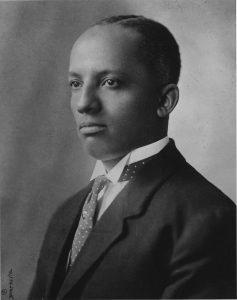Have your ever wondered about the history of Black History Month? Dr. Carter G. Woodson is credited with bringing to the forefront the importance of teaching about Black History, Culture and Life.

Carter G. Woodson, was the son of former slaves, and as a child, worked as a sharecropper, a miner and other odd jobs to help support his large family. Although he entered high school late, he graduated in two years; he attended Berea College in Kentucky, then worked in the Philippines for the U.S. government as a superintendent. He attended the University of Chicago and earned his bachelor’s and master’s degree. Subsequently, he made history as the second African American to earn his doctorate degree from Harvard.
To promote the scientific study of Black life and history, Dr. Woodson along with Alexander L. Jackson, George Cleveland Hall, William B. Hartgrove and James E. Stamps, founded the Association for the Study of Negro Life and History (ASNLH) in 1915, which later became the Association for the Study of African American History (ASAAH). Desiring to educate young African Americans about ancestral history, heritage and achievements, Dr. Carter along with his college fraternity, Omega Psi Phi, started ‘Negro History and Literature Week’ in 1924. Two years later, Dr. Woodson expanded the recognition as Negro History Week in February of 1926. Dr. Woodson chose February, the birth month of President Abraham Lincoln and Dr. Frederick Douglas, both recognized in as significant figures in African American History.
During the 1940’s and before his death in 1950, Dr. Woodson conveyed that Black history was too important to be pigeon holed into a limited time frame and was an early proponent of Negro History Year. Dr. Woodson often spoke in West Virginia and Blacks there became early adopters of the February celebration as Black History Month. Frederick H. Hammaurabi, a Chicagoan cultural activist, began promoting Black History Month in the mid-1960s. With increasing awareness of African consciousness by Black on college campuses, there was an appeal to the ASAAH to change with the times; the Association used its influence for a transformative shift to institutionalize the celebration from Negro History Week to Black History Month in 1976, on the 50th Anniversary of the first Negro History Week.
The 2022 Theme for Black History Month is Black Health and Wellness. UConn Extension’s Expanded Food and Nutrition Education Program (EFNEP) is celebrating with fun food facts, recipe and much more. Stay tuned throughout this month!
Article By U.R. Taylor, MS, RDN, CDN (02/2022)
UConn Extension Educator/EFNEP Supervisor